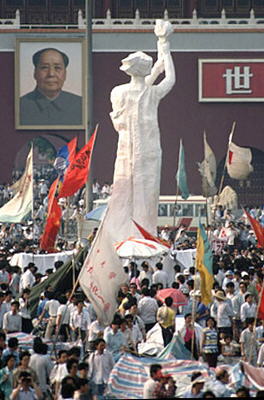Maoism
China, capitalist accumulation and the world crisis

By Martin Hart-Landsberg
[A version of this article appeared in the South Korean journal, Marxism 21. It has been posted at Links International Journal of Socialist Renewal with Martin Hart-Landsberg’s permission.]
February 2010 -- The consensus among economists is that China’s post-1978 market reform policies have produced one of the world’s greatest economic success stories. Some believe that China is now capable of serving as an anchor for a new (non-US dominated) global economy. A few claim that the reform experience demonstrates the workability (and desirability) of market socialism. This paper is critical of these views.
China today: socialist or capitalist?
November 13, 2009 -- Links International Journal of Socialist Renewal has published a number of articles on the Chinese Revolution and the subseque

October 26, 2009 -- This interview first appeared on the web site of the Britain-based World People's Resistance Movement (WPRN). It has been posted at Links International Journal of Socialist Renewal with permission. Baburam Bhattarai is a politburo member of the Unified Communist Party of Nepal (Maoist) and was finance minister in the former Maoist government led by Prachanda. For background to this interview, visit HERE.
* * *
China: Youth and the Cultural Revolution

For more on the Chinese Revolution, click HERE.
People's Republic of China at 60: socialist revolution, capitalist restoration

[Click HERE for more analysis of the Chinese Revolution and its evolution.]
By Chris Slee
September 23, 2009 -- October 1 will mark 60 years since Mao Zedong proclaimed the creation of the People's Republic of China. This followed the victory of the People’s Liberation Army, led by the Communist Party of China (CCP), over the US-backed Kuomintang (Chinese Nationalist Party, KMT).
In 1921, when the CCP was founded, China was in chaos. Western intervention — military, economic, political and cultural — had destroyed or undermined traditional Chinese institutions. New, stable institutions had not been created. Various imperialist powers grabbed pieces of Chinese territory.
Some modern industry was established, mainly in the coastal cities. But most Chinese people were peasants, heavily exploited by big landowners.
People's Republic of China at 60: Maoism and popular power, 1949–1969

Youth demonstrate during the Cultural Revolution.
[Click HERE for more analysis of the Chinese Revolution and its evolution.]
By Pierre Rousset
With the proclamation of the People’s Republic of China on October 1, 1949, the Chinese Communist Party (CCP) found itself at the head of a country three times larger than Western Europe, with a population of some 500 million. The internal situation was favourable to the revolutionary regime. At the end of a long series of civil and foreign wars, the population sought and relied on the new leaders to achieve peace while the ongoing people’s mobilisation opened the way for a deep reform of society.
People's Republic of China at 60: 1925–1949 -- Origins of the Chinese revolution

The rise and fall of the Communist Party of Thailand
September 9, 2009 -- ESSF -- The communist movement was first established in Siam (renamed Thailand in 1939) mostly in the Chinese ethnic migrant communities, then proliferated in the seemingly disparate surrounding regions in the north, northeast and south of the country. Following a long, difficult period of transition, the Communist Party of Thailand (CPT), once an urban party, retreated to the jungle and engaged in armed struggle. Its national expansion, during the 1970s, occurred while the kingdom was transformed into a US base for military intervention in the Vietnam War. The party eventually saw its decline during the Sino-Indochinese conflict of 1978–9 and disappeared from sight in the mid-1980s.
Suffering and struggle in rural China

Will the Boat Sink the Water? The
Life of Chinese Peasants.
By Chen Guidi and Wu Chuntao.
50 years after: The tragedy of China’s `Great Leap Forward'
April 21, 2009 – Socialist Voice – On October 1, the People’s Republic of China will mark the 60th anniversary of its foundati

By Martin Hart-Landsberg
Against the Current -- Interest in the post-1978 Chinese market reform experience remains high and for an obvious reason: China is widely considered to be one of the most successful developing countries in modern times. The Chinese economy has recorded record rates of growth over an extended time period, in concert with a massive industrial transformation. Adding to the interest is the Chinese government's claim that this success demonstrates both the workability and superiority of "market socialism."
There are those on the left who share this celebratory view of the Chinese experience, believing that it stands as an effective rebuttal to the neoliberal mantra that still dominates economic thinking. Therefore, they encourage other countries to learn from China's gradual, state controlled process of marketization, privatization, and deregulation of economic activity. A small but significant number share the Chinese government's view that China has indeed pioneered a new type of socialism.
